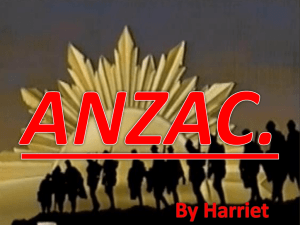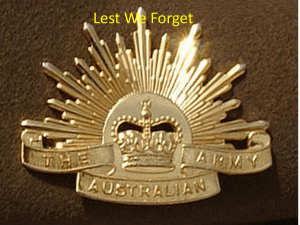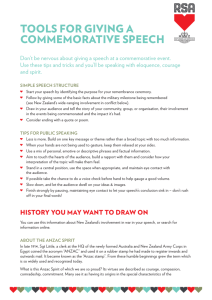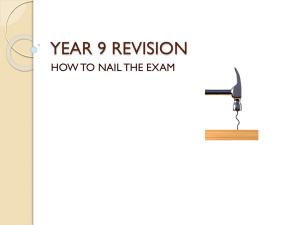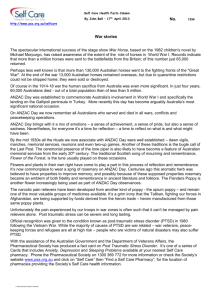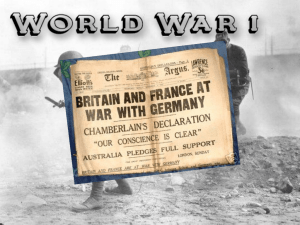Anzac
advertisement
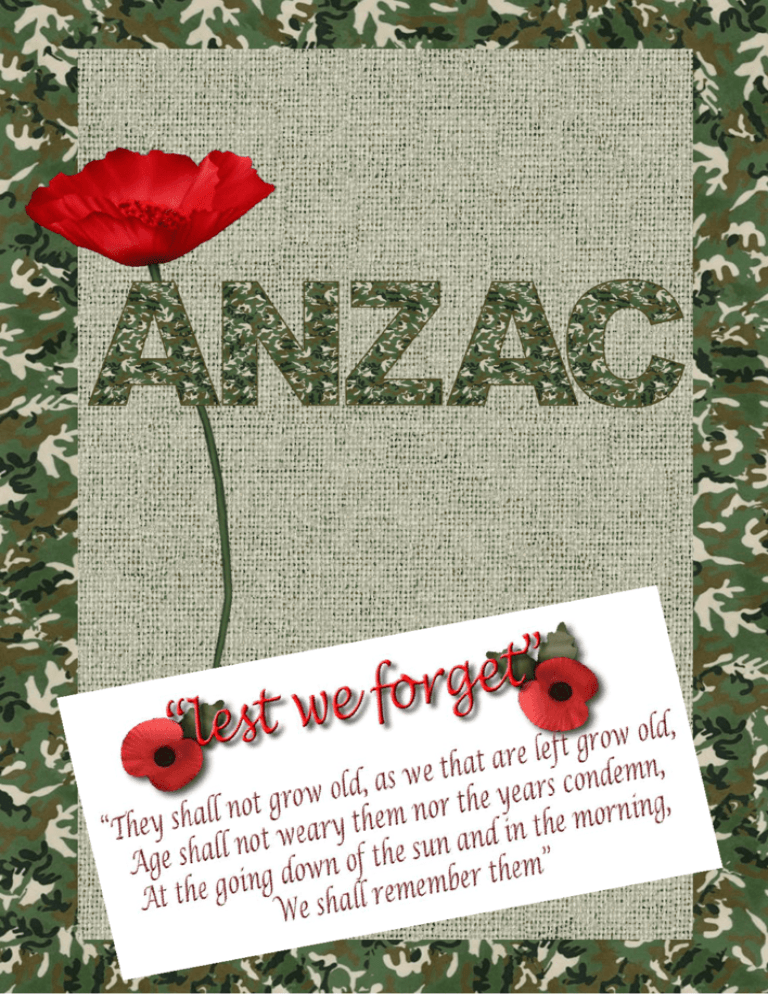
Meaning The word Anzac is part of the culture of New Zealanders and Australians. People talk about the 'spirit of Anzac'; there are Anzac biscuits, and rugby or rugby league teams from the two countries play an Anzac Day test. The word conjures up a shared heritage of two nations, but it also has a specific meaning. Anzac is the acronym for Australian and New Zealand Army Corps. This corps was created early in the Great War of 1914– 18. In December 1914 the Australian Imperial Force and New Zealand Expeditionary Force stationed in Egypt were placed under the command of Lieutenant General William Birdwood. Initially the term Australasian Corps was suggested, but Australians and New Zealanders were reluctant to lose their separate identities completely. No one knows who came up with the term Anzac. It is likely that Sergeant K.M. Little, a clerk at Birdwood's headquarters, thought of it for use on a rubber stamp: 'ANZAC' was convenient shorthand. Later the corps used it as their telegraph code word. Meaning The Anzacs first saw action at Gallipoli on 25 April 1915. The small cove where the Australian and New Zealand troops landed was quickly dubbed Anzac Cove. Soon the word was being used to described all Australian and New Zealand soldiers who fought on the Gallipoli Peninsula. Eventually it came to mean any Australian or New Zealand soldier. Anzac Day Anzac Day occurs on 25 April. It commemorates all New Zealanders and Australians killed in war and also honours returned servicemen and women. The date itself marks the anniversary of the landing of New Zealand and Australian soldiers – the Anzacs – on the Gallipoli Peninsula in 1915. Thousands lost their lives in the Gallipoli campaign: 87,000 Turks, 44,000 men from France and the British Empire, including 8,500 Australians and 2,721 New Zealanders (almost one in four of those who served on Gallipoli). Anzac Day was first marked in 1916. The day has seen many changes over the years. The ceremonies that are held at war memorials all over New Zealand and Australia, and in places overseas where New Zealanders and Australians gather, remain rich in tradition and ritual befitting a military funeral. Anzac Day Service Outline Commemoration Service for ANZAC Day (Brief version suitable for primary schools) Introduction (2 minutes) Hymn (2 minutes) Prayer (1 minute) An address by an ex Serviceman, Serving Member of the Defence Force, Local Dignitary, Teacher or Student Wreath Laying Ode Last Post Minute Silence Reveille or Rouse National Anthem This service would take approximately 20 minutes depending on the length of speeches and prayers and the number of verses of hymns sung. The ceremony should normally take place in the morning. The introduction should briefly set the scene of the ANZAC Day remembrance. Prayers or Odes should be of remembrance, for peace and for the future of Australia and New Zealand. The address should be given by an appropriate person and should stress the sacrifices made by servicemen and women in all conflicts, the meaning of ANZAC in the establishment of the Australian national identity and stress that remembrance does not glorify war. The Red Poppy The red poppy has become a symbol of war remembrance the world over. People in many countries wear the poppy to remember those who died in war or who still serve. In many countries, the poppy is worn around Armistice Day (11 November), but in New Zealand and Australia it is most commonly seen around Anzac Day, 25 April. The red or Flanders poppy has been linked with battlefield deaths since the time of the Great War (1914–18). The plant was one of the first to grow and bloom in the mud and soil of Flanders. The connection was made, most famously, by Lieutenant Colonel John McCrae in his poem 'In Flanders fields'. ‘In Flanders fields’ In Flanders fields the poppies blow Between the crosses row on row, That mark our place; and in the sky The larks, still bravely singing, fly Scarce heard amid the guns below. We are the Dead. Short days ago We lived, felt dawn, saw sunset glow, Loved and were loved, and now we lie In Flanders fields. Take up our quarrel with the foe: To you from failing hands we throw The torch; be yours to hold it high. If ye break faith with us who die We shall not sleep, though poppies grow In Flanders fields. Poem In Flanders field In Flanders fields the poppies blow Between the crosses row on row, That mark our place; and in the sky The larks, still bravely singing, fly Scarce heard amid the guns below. We are the Dead. Short days ago We lived, felt dawn, saw sunset glow, Loved and were loved, and now we lie In Flanders fields. Take up our quarrel with the foe: To you from failing hands we throw The torch; be yours to hold it high. If ye break faith with us who die We shall not sleep, though poppies grow In Flanders fields. by Lieutenant Colonel John McCrae craft Make a Poppy 1. 2. 3. 4. 5. Colour poppy flower red and cut out Colour circle black and cut out. This is glued to the front of the flower in the centre. Cut out stem (with name tag attached). Glue to the back of the poppy. Honour a soldier by putting his/her name on the name tag. Put your own name on the back. Gallipoli Slang (1) Once they had enlisted, and contacts with the outside world were cut short, the Anzac troops quickly adopted a number of new words and expressions. Many of them reflect their daily lives in the Gallipoli trenches. The following are just a few of such slang words. You may recognise some of them and use them yourself today. Abdul a nickname for a Turkish soldier. See also 'Jacko', Johnno' and 'Johnny Turk'. Also used as a collective noun. 'Abdul did not seem to trust the situation and was pretty active in our sector. adventurer, an a member of the 1st Division (name given by the 2nd Div. who thought they had joined for the adventure and nothing else). alf a mo 1. one moment, please 2. a tiny moustache "half a moment" and by analogy "half a moustache” Anzac button, an a nail used instead of a button to hold up trousers. Anzac soup a shell hole full of water polluted by a corpse. Anzac stew any improvised meal the troops managed to prepare from their monotonous rations. e.g. a bucket of hot water with one rind of fat bacon in it. Anzac wafer, an a hard biscuit. See 'rock-chewer. Auntie, another name for a Turkish broomstick bomb. Sent as a warning:' Auntie coming over! Gallipoli Slang (2) axle grease, butter backshish, (backsheesh, buckshee) Begging for cigarettes or chocolate, or offering services as a guide etc. bags of A lot, a great number, a great amount. (‘We had bags of shrapnel on the beach last night.) banger, a a sausage. banjo, a a shovel. ‘Swinging the banjo’ was used for digging. Base wallah, a someone with a relatively safe job at base, far behind the front line. bettle, a a landing craft for 200 men. bergoo, Porridge Birdie, General Birdwood who, according to the troops, was a ‘decent enough bloke’. bivvy, a bivouac Body-snatcher, a Either a stretcher bearer, or a member of a raiding party. bonzer, boshter, bosker, very, very ... , expressing a superlative quality of something. Gallipoli Slang (3) brass, brass hat Nickname for higher officers buzz off, to go or run away camel dung Egyptian cigarettes. clobber clothes. cobber, a a mate, a friend. coffin nail, a a cigarette. cow, a an obnoxious person in whose company a ‘dinkum’ soldier would not be seen. cricket ball, a Turkish handgrenade the same shape and size as a cricket ball. digger, a Anzac soldier dinkum real, original, vintage. dinkum Aussies / Fair Dinkums: volunteers. dinkum oil: true news divvy, a a division. dry rations, a sermon. Gallipoli Slang (4) En-Zedders New Zealanders furphy, a a camp rumour Gallipoli gallop, the diarrhoea (also know as the ‘Turkey trot’) Gippo Egyptian. greybacks lice. grungey self-made dish consisting of bully beef, buscuits, onion, water and salt. Then heated. gutzer, a a piece of bad luck, a misfortune. igri, hurry up. Imshi Yalla go away. Jacko (Johnny) Turk, also ‘Johnno’ jam tin (bomb), a Crude bomb made from a jam tin filled with an explosive charge, metal scraps, lengths of barbed wire or empty cartridges, and then given a fuse. As the supply of bombs during the campaign was very insufficient, a ‘factory’ for the manufacturing of these ‘jam tins’ was established inside Anzac Cove. Gallipoli Slang (5) kangaroo feathers the emu plumes at one side of a Light Horseman’s hat, in fact a patch of emu hide with the feathers still attached. Among the Arabs, the Light Horsemen became known as “the Kings of the Feathers’. Kiwi New Zealander Knocked (out) Killed or wounded Lance corporal bacon Very fat bacon, with only one streak of lean running through it. Lazy liz, a (Liz, Lizzie) a big shell fired by the battleship Queen Elisabeth and passing overhead with ‘a lazy drone’. Linseed Lancers, a Field Ambulance men Luna Park Cairo Hospital mafeesh Finished, not available anymore (‘When we finally reached the place, all the eggs were mafeesh.’) maleesh Never mind, it doesn’t matter. Jacko (Johnny) Turk, also ‘Johnno’ mate, a Aussies did not have friends, they had ‘mates’. Gallipoli Slang (6) oil Information, news. outed Killed, taken care of Peninsh, the the Gallipoli Peninsula pill, a a bullet possie, a a firing position, but also a hole excavated in the side of a trench to rest. red-caps, the British military police Rock-chewer, a a dry biscuit, responsible for many broken teeth and dentures, a problem that was even aggravated by the fact that originallly there were no dentists (nor any instruments for dental surgery) with the medical services on Gallipoli. shrapnel apart from the explosive, also used for the chicken peas that Australian POW’s in Turkey sometimes found as an addition to their standard dailty ration of boiled wheat. smoko, a a break for a cigarette. snipe, to to shoot at the enemy from a hidden position. stiff, a a corpse, a dead soldier Gallipoli Slang (7) stiffs’ paddock, a a graveyard. stunt, a Originally a small-scale operation, involving a relatively small body of men, but later also used for bigger enterprises. stouch, to to fight, hit, kill or use violence in general. taube, a German airplane, used for reconnaissance over the lines, but also capable of dropping explosive ‘eggs’. throw a seven, to to get killed. typewriter, a a machine gun. wallah, a A man, a person. wangle, to to acquire through some sort of trick or clever scheme. wazzah, a a dugout whizz-bang, a German 77 mm shell write-off, a a casualty, a corpse, a ruined military vehicle. Gallipoli Slang A soldier’s letter Read this letter, which contains the sort of language soldiers used on Gallipoli. Refer to the slang list provided in this resource or research using the internet and recommended sites. Try to work out the meaning before you use the list! Would this soldier understand the slang you use today? Dear Harry Here I am propped on the peninsh with a crowd of other tourists, so I thought I’d grab a few mos now that the brass hats have gone off to have a chin-way and tell you a bit about what it’s like stouching with Abdul. Well, most of the time we’re bored to death, the rest of the time we’re scared to death, especially when auntie visits or a cricket ball comes over. We spend a lot of time winging the banjo, and only yesterday had to put in a new winze, following damage to our trenches from Beachy Bill. ANZAC soup all over no-man’s-land. The food’s pretty crook. Most days the babbling brook brings bully and hard tack; we were hoping the arrival of a supply ship meant we’d be getting acle grease with it today, but apparently that was just a furphy. We had a couple of bumrushers here this morning, warning that the base wallahs would be arranging short arm inspection before we were allowed to go on leave, so we had better make sure we were wearing clean chatbags. Where do you think we’re going to find water to wash them in? You should’ve seen the lookk on his dial when I asked him that! It’s enough to make a man ask for an Aussy. Well, old chap, must fly. Give my regards to Emma and Jane and send us a few packets of coffin nails next time you write. Your pal John When you have worked out what the soldier meant in the extract above, try writing your own letter, using current slang. Do you think your grandparents would understand what you have written? Do you think your future grandchildren will? What does this tell you about the nature of slang? Gallipoli Slang Across: 1. Nail used to hold up a soldier's trousers (5, 6) 4. An Australian. 6. Water polluted by a dead body in a hole in the ground left by an exploding shell (5, 4). 9. Shoveling (5, 8). 10. Tinned meat (5, 4). 12. A sausage. 13. An Anzac soldier. 14. A mate. Crossword Down: 2. Hand-grenade (7, 4). 3. Real. 5. A hard biscuit eaten in place of bread (5, 5). 7. Clothes. 8. A boring and poor quality meal made with what was available, for example, a bucket of water with a piece of bacon in it (5, 4). 11. Very, very. Anzac biscuits Anzac biscuits have always been associated with Australian and New Zealand soldiers in World War I. Legend says that the wives, mothers and girlfriends left at home were concerned that their fighting men were not getting enough (or any) food of any nutritional value, so they cooked up a recipe for treats that they would both enjoy and nutritionally benefit from. Made from ingredients including rolled oats, coconut, flour and sugar, these biscuits were ideal to send to soldiers abroad because they kept well and would survive the long transit to the frontlines. At first, they were named "soldiers biscuits", but were renamed Anzac biscuits upon landing in Gallipoli. Today, Anzac biscuits are manufactured commercially and sold in supermarkets all year round. They are also used for fundraising by the Australian RSLs and the New Zealand RSAs. Anzac biscuits Recipe 1 cup rolled oats 1 cup plain flour 1 cup brown sugar ½ cup desiccated coconut 125g butter 2 tablespoon golden syrup 1 tablespoon water ½ teaspoon bicarbonate of soda Sift flour into a bowl and stir in oats, coconut and sugar. Melt butter, golden syrup and water in saucepan, then add bicarb. Stir into flour mixture. Place rounded teaspoons of mixture 5cm apart on greased baking trays and bake at 150°C for about 20 minutes or until biscuits feel almost firm. Remove from trays with spatula and leave to cool on wire racks. Great Links http://www.anzacsite.gov.au/download/ryebuck_anz ac.pdf http://www.anzackids.com/index.htm http://www.nzhistory.net.nz/war/anzacday/introduction http://www.awm.gov.au/commemoration/anzac/anza c_tradition.asp http://australia.gov.au/about-australia/australianstory/anzac-day http://www.kiwifamilies.co.nz/articles/anzac-day/ Great Resources
